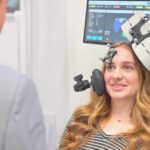
Family Therapy: 5 Ways to Strengthen Your Parent-Child Relationship
March 15, 2025
TMS for Teens: FDA Clears Groundbreaking Depression Treatment for Adolescents Ages 15–21
April 15, 2025If you find yourself asking how you can better support your child’s journey to improved mental health, you are one step in the right direction toward accomplishing it. As parents, in the current clime of social media experts and endless amounts of bite-size tips, there also comes confusion as to what is really helpful. In a calm, nurturing setting where your child is ideally receiving treatment, you can also help create this environment at home.
Apogee Behavioral Medicine has some guidelines that we discuss with families when one or more members are undergoing treatment. These are absolutely not requisites to recovery. We know that sometimes home lives and environments can be difficult to control. The important thing to remember is that when we are treating teens and young adults, the more we understand the process and are able to be a place of support and comfort, the more positive the outcomes.
Autonomy
When we discuss autonomy, many parents see sirens go off in their heads and become filled with shame and guilt. How we raise children has changed drastically and fostering autonomy for many is a formidable challenge. In the context of child development, it refers to a child’s ability to make their own decisions and choices. They can act according to their preferences and feel control over their lives. When we encourage autonomy, we help them develop a strong sense of self, give them agency over their lives, and instill life skills. It is a critical aspect of growth, as it empowers them to learn from experiences, understand their bodies, and take responsibility for their actions.
When a teen or young adult presents with disorders like anxiety, depression, disordered eating, or ADHD, it will seem to parents that this is a time when teens should have less autonomy and should be regulated and closely watched. This is an area that is counterintuitive to parents trying to protect their children. When teens are suffering it might be a time when parents want to step in and try to make things better, or rather make decisions on the teen’s behalf. In outpatient treatment, it is important that teens have the agency to make age-appropriate decisions and that in their course of treatment, they do not feel out of control.
The goal of treatment is for teens to develop into young adults, who are confident in their decisions and thrive into adulthood. By fostering autonomy we empower teens to lead their treatment and for parents to trust in their child’s ability to function in the world.
Nonviolent Communication
Nonviolent Communication (NVC) is a person-centered therapy, developed by clinical psychologist Marshall Rosenberg in the 1960s and 1970s and is an approach to communication that is helpful to implement when your teen is in treatment. It is founded on principles of nonviolence and psychology and helps parents deepen empathy and understanding with their teens by building dialogue and understanding. We can often be so ingrained in a way of communication that it becomes impossible to communicate without entering into conflict. This is why NVC is so useful.
The basics of NVC are observation, feeling, need, and request (OFNR). When we are able to use these individual components and break them down they help individuals express themselves without judgment, recognize feelings and needs, and make clear, positive requests. How does this factor into supporting teens in therapy? One way is through observation, often when symptoms are present that are currently being treated for, if a parent points these out, it can feel to the teen like observation with judgment. Which reduces their autonomy, and can lead to conflict. Using the NVM, a parent can explain their feeling of concern empathetically as their own feeling, properly express a need, and make a request in a way that is not threatening.
NVC and other communication techniques are used to improve communication between caregivers and those undergoing treatment. Where teens are medicated or are in a period of adjustment in treatment, it is very very important to be empathetic in communications and to not be threatening or perceived as threatening. NVC is effective because it is a methodology that mitigates these perceived threats.
Space
Giving teens space during treatment helps them process their emotions and learn about how they are feeling, and how to deal with their symptoms. Treatment for mental disorders is by no means a quick fix or forward-moving trajectory. Treatment for anxiety, depression, disordered eating, and more are often lifelong. Discovering these early improves the outcomes tremendously, however, there is a line between being mindful of where you see symptoms accelerating and being clingy and overprotective.
Creating space for teens is more like a container for non-judgment, where your teen can express their feelings and thoughts. You can empathize with them, when appropriate, and let them know it is ok for them to talk to you and that you will support them. Therapy is often the bridge that is built for parent and teen communication. First, the safe space is created in the office and then can be nurtured at home. This is often where real and lasting healing takes place as a result of therapy.
Engagement
Along with autonomy, empathetic and nonviolent communication, and space is staying engaged. This is a long journey. Often it is not linear. There can be changes in need of medication, symptoms progress, and then abate, it is vital for parents to remain engaged and enthusiastic. This can be very challenging, especially with behaviors that are difficult to live with. We highly recommend that to be the best version for your teen, you seek complementary therapy.
Being a support system requires your own support. Therapy is an excellent place to bolster those supports that help you manage treatment effects on your own mental health. Apogee Behavioral Medicine commonly treats teens for a variety of disorders and conditions. Our psychiatrists and psychologists combine therapies specifically for your teens’ unique symptoms and history. ADHD, depression, anxiety, and disordered eating are all areas of particular expertise.
Self-Care
Supporting a teen through mental health treatment can be emotionally and mentally draining. Parents often feel the weight of responsibility and may neglect their own well-being in the process. Therapy, mindfulness, and self-care practices can help parents manage their own stress and emotions while providing the best possible support for their child. When parents prioritize their own mental health, they create a healthier, more stable environment for their teen. This includes:
- Seeking their own therapy to navigate challenges and avoid burnout.
- Practicing self-compassion and recognizing that parenting is a learning process.
- Engaging in activities that bring personal fulfillment and relaxation.
- Establishing boundaries to maintain emotional balance.
- By taking care of themselves, parents model healthy coping mechanisms and create a more supportive home environment, reinforcing the benefits of therapy for their teen.
We live in a world today of constant comparison. This can be a thief of joy, most especially during formative years when our children are forming opinions of themselves, how they identify, and how they want to move and contribute to the world. As parents in this dynamic, it is important that we not only foster love and support for our kids but also for ourselves. Each generation of parents is using the tools that they know and there is no set guide on doing this right. Let’s take the next step together and help our teens succeed.
To Make Each Day Better is the mission of Apogee Behavioral Medicine, and we are here to start paving the way to better days.
